Serving 3,119 students in grades 9-12, Shadow Ridge High School ranks in the top 50% of all schools in Nevada for overall test scores (math proficiency is bottom 50%, and reading proficiency is bottom 50%).
The percentage of students achieving proficiency in math is 18% (which is lower than the Nevada state average of 28%). The percentage of students achieving proficiency in reading/language arts is 50% (which is higher than the Nevada state average of 44%).
The student:teacher ratio of 25:1 is higher than the Nevada state level of 19:1.
Minority enrollment is 63% of the student body (majority Hispanic), which is lower than the Nevada state average of 73% (majority Hispanic).
Quick Stats (2025)
- Grades: 9-12
- Enrollment: 3,119 students
- Student:Teacher Ratio: 25:1
- Minority Enrollment: 63%
- Graduation Rate: 94% (Top 20% in NV)
- Overall Testing Rank: Top 50%
- Math Proficiency: 18% (Btm 50%)
- Reading Proficiency: 50% (Top 30%)
- Science Proficiency: 23% (Top 50%)
- Source: National Center for Education Statistics (NCES), NV Dept. of Education
Top Rankings
Shadow Ridge High School ranks among the top 20% of public schools in Nevada for:
Category
Attribute
Graduation Rate
Diversity
Percent Eligible For Free Lunch
School Overview
Shadow Ridge High School's student population of 3,119 students has stayed relatively flat over five school years.
The teacher population of 127 teachers has grown by 13% over five school years.
Grades Offered
Grades 9-12
Total Students
3,119 students
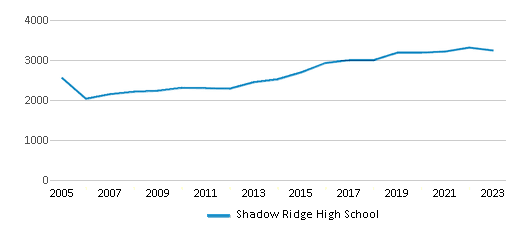
Gender %
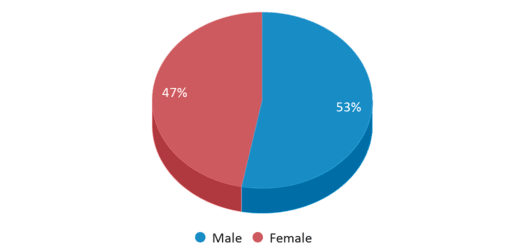
Total Classroom Teachers
127 teachers
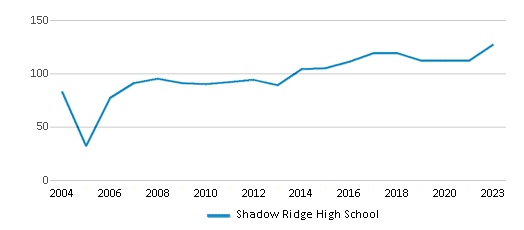
Students by Grade
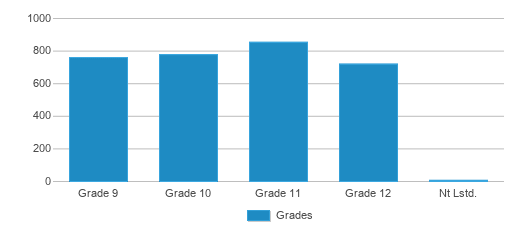
School Rankings
Shadow Ridge High School ranks within the top 50% of all 692 schools in Nevada (based off of combined math and reading proficiency testing data).
The diversity score of Shadow Ridge High School is 0.74, which is more than the diversity score at state average of 0.71. The school's diversity has stayed relatively flat over five school years.
Overall Testing Rank
#339 out of 692 schools
(Top 50%)
(Top 50%)
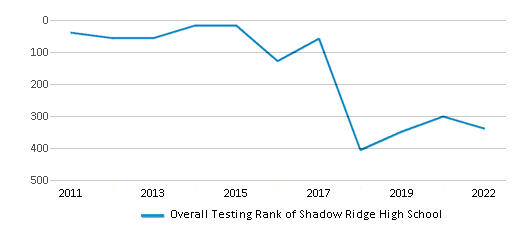
Math Test Scores (% Proficient)
18%
28%
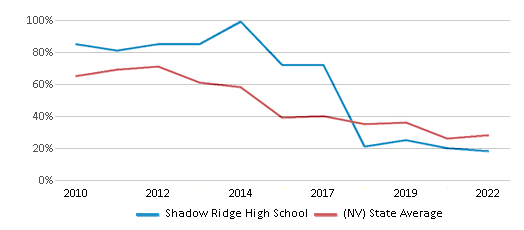
Reading/Language Arts Test Scores (% Proficient)
50%
44%
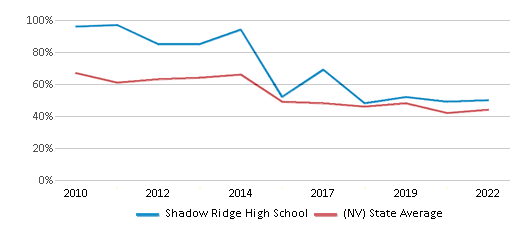
Science Test Scores (% Proficient)
23%
26%
Student : Teacher Ratio
25:1
19:1
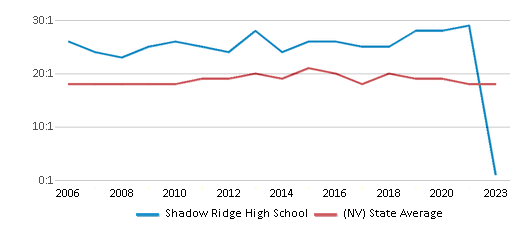
American Indian
n/a
1%
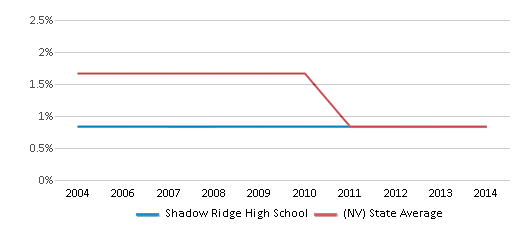
Asian
4%
6%
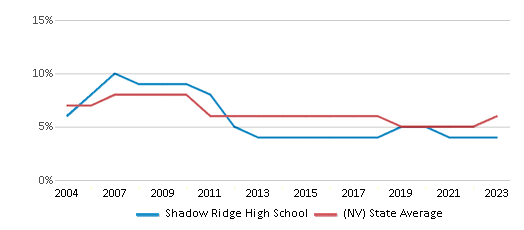
Hispanic
31%
45%
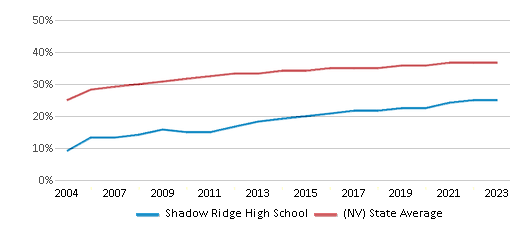
Black
16%
12%
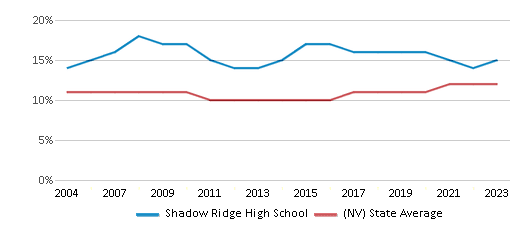
White
37%
27%
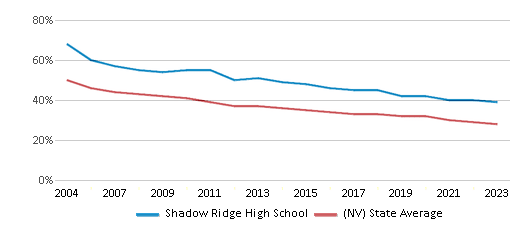
Hawaiian
2%
1%
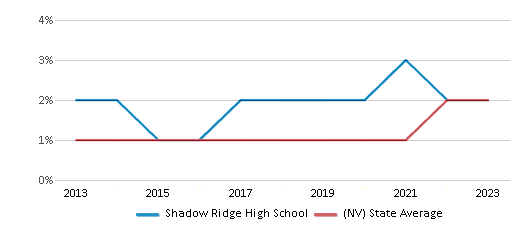
Two or more races
10%
8%
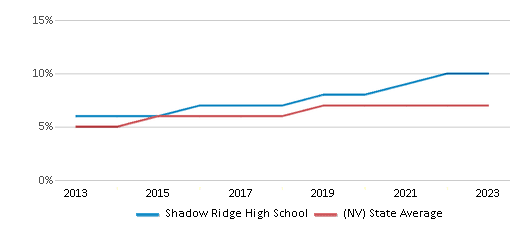
All Ethnic Groups
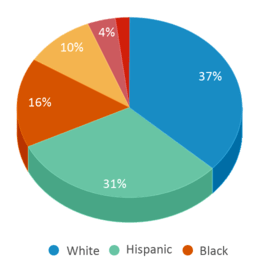
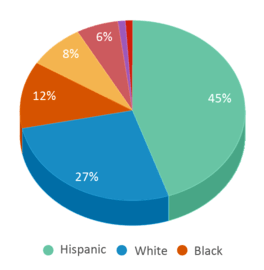
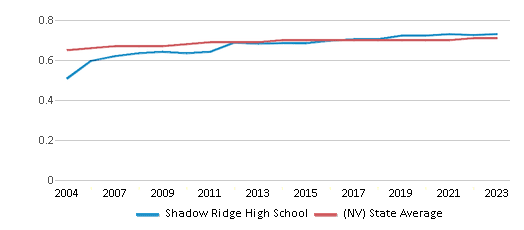
Graduation Rate
94%
82%
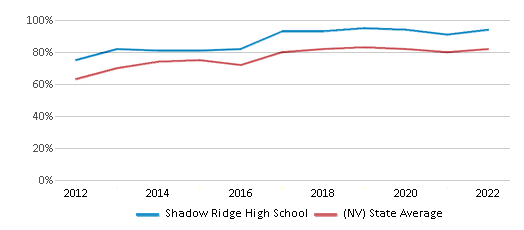
Participates in the National School Lunch Program (NSLP)
Yes
Eligible for Free Lunch
99%
80%
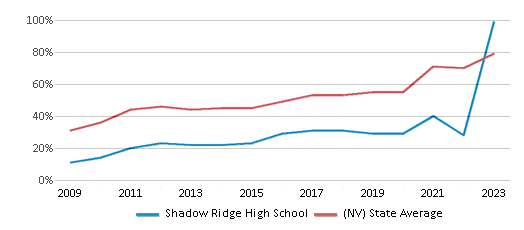
Eligible for Reduced Lunch
1%
2%
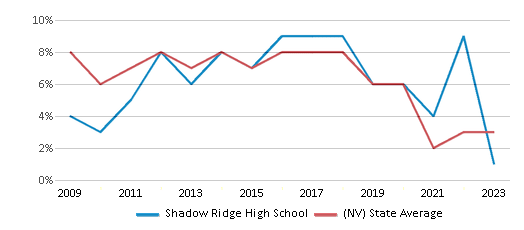
School Statewide Testing
School District Name
Source: National Center for Education Statistics (NCES), NV Dept. of Education
Profile last updated: 02/09/2025
Frequently Asked Questions
What is Shadow Ridge High School's ranking?
Shadow Ridge High School is ranked #339 out of 692 schools, which ranks it among the top 50% of public schools in Nevada.
What schools are Shadow Ridge High School often compared to?
Shadow Ridge High Schoolis often viewed alongside schools like Arbor View High School, Centennial High School by visitors of our site.
What percent of students have achieved state testing proficiency in math and reading?
18% of students have achieved math proficiency (compared to the 28% NV state average), while 50% of students have achieved reading proficiency (compared to the 44% NV state average).
What is the graduation rate of Shadow Ridge High School?
The graduation rate of Shadow Ridge High School is 94%, which is higher than the Nevada state average of 82%.
How many students attend Shadow Ridge High School?
3,119 students attend Shadow Ridge High School.
What is the racial composition of the student body?
37% of Shadow Ridge High School students are White, 31% of students are Hispanic, 16% of students are Black, 10% of students are Two or more races, 4% of students are Asian, and 2% of students are Hawaiian.
What is the student:teacher ratio of Shadow Ridge High School?
Shadow Ridge High School has a student ration of 25:1, which is higher than the Nevada state average of 19:1.
What grades does Shadow Ridge High School offer ?
Shadow Ridge High School offers enrollment in grades 9-12
What school district is Shadow Ridge High School part of?
Shadow Ridge High School is part of Clark County School District.
In what neighborhood is Shadow Ridge High School located?
Shadow Ridge High School is located in the Tule Springs neighborhood of Las Vegas, NV. There are 3 other public schools located in Tule Springs.
School Reviews
5 5/21/2020
I attended this school until halfway through junior year. I was part of a class of 2015. I enjoyed my time here and was very involved in clubs, sports and activities. Also, when comparing Shadow Ridge to the other school I transferred to, Shadow Ridge had far better academics and programs available. I felt like Shadow Ridge had a much more difficult and more challenging curriculum (which is a good thing) and prepared me better for university versus the school that I transferred to. The only thing was at the time I was there, our football team wasn''t very good, but men's volleyball, women's soccer, cross-country, and wrestling were all pretty good. But it would have been better if the football team was better just because it's more fun to win games for the morale of the school.
2 11/9/2010
The administration of this school does not seem to be concerned about quality of staff, or doing the best it can for its students. Note the easy requirements for passing grades (lack of grammar, punctuation, spelling,etc.,corrections in course work). The lack of students participating in extra-curricular activities is a sure sign that students are not encouraged to participate by the administration. The low number of students in the sports programs and poor win records in those programs indicate again, the administration really are not student advocates.
Review Shadow Ridge High School. Reviews should be a few sentences in length. Please include any comments on:
- Quality of academic programs, teachers, and facilities
- Availability of music, art, sports and other extracurricular activities
Recent Articles

What Is A Charter School?
Explore the world of charter schools in this comprehensive guide. Learn about their history, how they operate, and the pros and cons of this educational innovation. Discover key facts about charter schools, including admission policies, demographics, and funding, as well as what to look for when considering a charter school for your child.

10 Reasons Why High School Sports Benefit Students
Discover the 10 compelling reasons why high school sports are beneficial for students. This comprehensive article explores how athletics enhance academic performance, foster personal growth, and develop crucial life skills. From improved fitness and time management to leadership development and community representation, learn why participating in high school sports can be a game-changer for students' overall success and well-being.

February 05, 2025
Understanding the U.S. Department of Education: Structure, Impact, and EvolutionWe explore how the Department of Education shapes American education, from its cabinet-level leadership to its impact on millions of students, written for general audiences seeking clarity on this vital institution.





